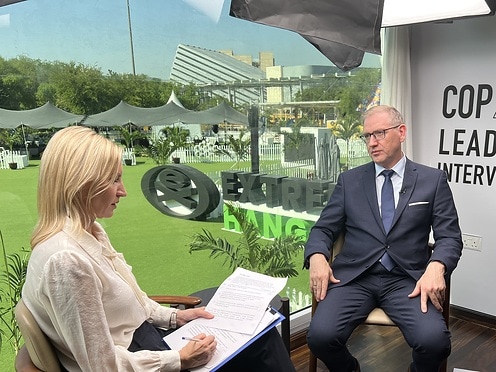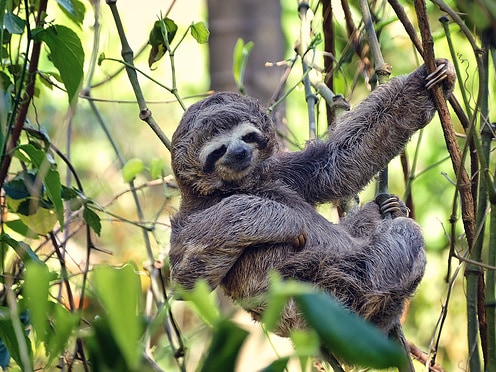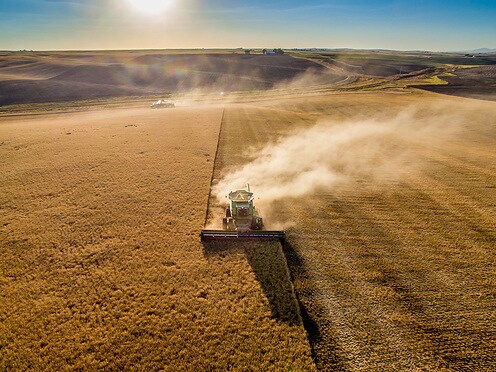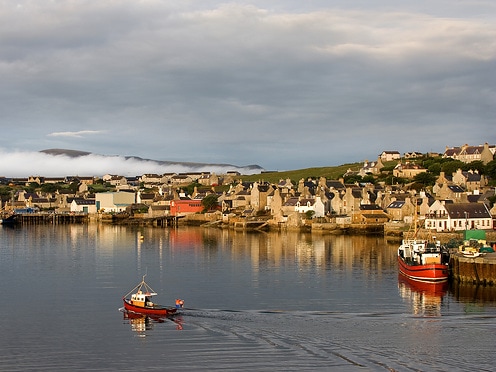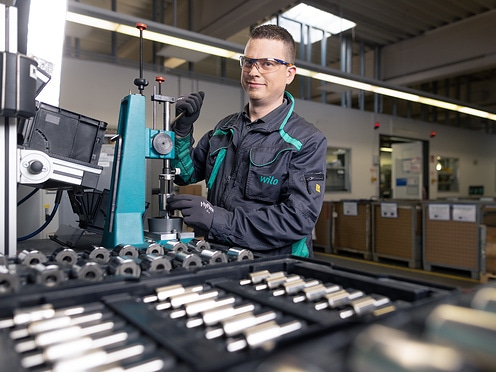Protecting bees – preserving biodiversity
This article features:
The importance of bees for the environment is now well documented. As pollinators, they are a fundamental part of healthy ecosystems. Anyone who is committed to sustainability should therefore pay attention to the little animals. Here, you’ll find out how you can protect bees and safeguard biodiversity.

Bees as an economic factor
According to the Intergovernmental Science-Policy Platform on Biodiversity and Ecosystem Services (IPBES), between 235 and 577 billion US dollars worth of food worldwide is reliant on the pollination activities of bees and other insects. A real economic factor: around three quarters of food production needs pollination and thus bees. And yet the little black and yellow creatures are more endangered today than ever. Climate change, modern agriculture, pesticides and insecticides, mowed lawns and many other factors are destroying their habitats. An issue that private persons, entrepreneurs and political decision-makers have to deal with ever more frequently: how can we operate responsibly and preserve sensitive habitats?
7 measures for bee protection
When you think about bees, you usually picture honey bees that circle around hives and are fed and cared for by their beekeeper. Yet, there are around 30,000 species of bees worldwide, some of which are in danger of becoming extinct. They often rely on certain plants as a source of food. And this is precisely where the challenge resides.
1. Natural gardens and green spaces
An immaculately mowed lawn, neatly trimmed edges, bushes and shrubs pruned to the millimetre – some gardens and parks are perfectly manicured. However, excessive maintenance of green spaces endangers numerous animals’ habitats. This is compounded by increasing urbanisation and the associated expansion of urban areas. Forests, parks and gardens continue to shrink as a result. However, natural green spaces are vital for our ecosystem and for preserving the animals that live there. So if you grow native plants and leave open spaces for nature, such as flower strips or wildflower meadows, you’ll be protecting the habitats of birds, insects and other animal species in the long term. Concepts for greening urban areas, organically farmed agricultural zones and recreational areas provide people and animals alike with a place of retreat and a green oasis in modern cities.
'Wilo has always taken a holistic approach towards sustainability. For us, this also includes actively protecting nature. Bees are an indispensable part of our ecosystem.'
2. Less soil sealing
Soil sealing is on the increase as a result of the global expansion of urban areas. Because more traffic areas, streets and living spaces are needed in areas where more people live. However, soil sealing prevents rainwater from seeping into the ground and causes flooding. Sealed surfaces prevent natural air cooling. In summer, they store lots of heat and further heat up cities. And soil fertility is also affected: when the soil is permanently sealed off from air and water, soil fauna has no chance of surviving. But it is vital for preserving and regenerating fertile soil. For many insects such as wild bees, this also means the loss of their habitat as they nest in the ground. Once sealed, surfaces are difficult and expensive to restore to their natural state. In addition, foreign substances often remain in the soil meaning that the natural soil quality cannot be achieved again and the fauna can only regenerate to a limited extent.
3. Avoiding pesticides
It has long been known that pesticides and insecticides not only harm the environment and bees, but also humans. That’s why in 2018, the European Union banned the use of neonicotinoids such as thiamethoxam, imidacloprid and clothianidin in agriculture. These agents attack the central nervous system of insects and cause paralysis and death even at very low doses. These pesticides are particularly dangerous for bees; even though they may not always be lethal, they nevertheless affect their sense of direction, memory and method of reproduction. So avoiding chemicals in your garden at home or in agriculture and using natural methods of pest control can keep ecosystems in balance.

4. Supporting sustainable agriculture
Sustainable agriculture means providing farm animals, insects and plants with natural conditions and avoiding harmful chemicals. However, it’s often hard for consumers to know whether what’s on the packaging is what’s really inside. The European Union has therefore set standards for awarding organic and eco labels. These are intended to help consumers identify products derived from sustainable agriculture. Initiatives such as the Federal Organic Farming Programme (BÖL) launched by the German government are committed to improving the overall conditions of organic farming. Programmes like this support research initiatives, knowledge transfer and carry out important public relations work to ensure the growth of sustainable agriculture.
'Our native crops and wild plants rely on honey bees as pollinators. By adopting the bees, we are committed to nature and the environment on site and are actively helping to protect bees.'
5. Creating nesting sites
Insect hotels that people set up in their gardens or beehives that are looked after by professional or amateur beekeepers on public or private property are already a common sight in many places. Particularly in urban regions, insects need nesting aids and retreats to replace ever-shrinking natural habitats. More and more companies are also finding out about insect protection. For example, a total of six bee colonies have been buzzing around the Wilopark in Dortmund since summer 2022, working hard to collect honey in their hives. The multinational technology group Wilo has adopted them. “Wilo has always taken a holistic approach towards sustainability. With defined sustainability goals, we are striving to supply more people with clean water and reduce our ecological footprint. For us, this also includes actively protecting nature. Bees are an indispensable part of our ecosystem. And I am proud that we are contributing to this with our bee sponsorship at the Dortmund site”, explains Georg Weber, Member of the Executive Board and Chief Technology Officer of the Wilo Group. And there’s an added benefit: the company sells the honey produced here to its staff, donating the proceeds to the Wilo-Foundation for sustainable initiatives.
Four bee colonies have also been successfully installed in Laval, France. The protection provided by hives enables the bees to do their work for a sustainable ecosystem.
6. Sharing knowledge

Beekeeper Ralf Riekenbrauck looks after six bee colonies at Wilopark in Dortmund. Based on its sustainability strategy, the multinational technology group has adopted the animals.
Most people are not aware of the significance of bees and insects for our environment and our planet. Educating friends and acquaintances can make a big difference. In addition, there are always opportunities for people to find out more about bees.
Beekeeper’s Question Time at Wilo
For example, employees and their families can learn interesting facts about honey bees during the regular Beekeeper’s Question Time at Wilo in Dortmund, including about the role of the beekeeper and the consequences of climate change for bees. “Climate change poses an increasing threat to our bee colonies. For example, particularly mild winters or the sudden onset of winter upsets the bees’ millennia-old rhythm and it’s then the job of the beekeeper to intervene to ensure the bees don’t starve”, explains Ralf Riekenbrauck, who takes care of the bees at Wilopark. Those attending the Question Time also learn that you should always rinse out honey jars before disposing of them. The sticky sweet residue in the honey jar attracts bees to the bins. However, they are often contaminated with spores of pathogens, which the bees then carry to their hive – often with deadly consequences for the entire bee colony.
For World Bee Day (20 May), Wilo organised a special beekeepers' Q&A session: employees and their children could ask beekeeper Ralf Riekenbrauck their questions. With this event, Wilo wants to contribute to raising awareness for nature conservation and environmental protection among future generations.
7. Supporting bee projects
Whether you actively help by setting up and professionally looking after beehives or support bee conservation financially - bee projects contribute to the long-term preservation of biodiversity. There are numerous organisations with “adopt a bee” programmes, who work locally for nature conservation, particularly in cities. At the same time, these initiatives make an important contribution to food production. “Our native crops and wild plants rely on honey bees as pollinators. By adopting the bees, we are committed to nature and the environment on site and are actively helping to protect bees”, CTO Georg Weber explains Wilo’s commitment to honey bees.
Summary: Bee protection in action
There are various ways to protect bees and other insects. Individuals, companies and even countries can help – from active protection measures to bans on harmful pesticides. Nature increasingly needs our help. Fragile ecosystems are endangered in particular when cities grow and traffic areas expand. We can all do our bit to preserve biodiversity. It doesn’t take a lot of effort to make a difference.
